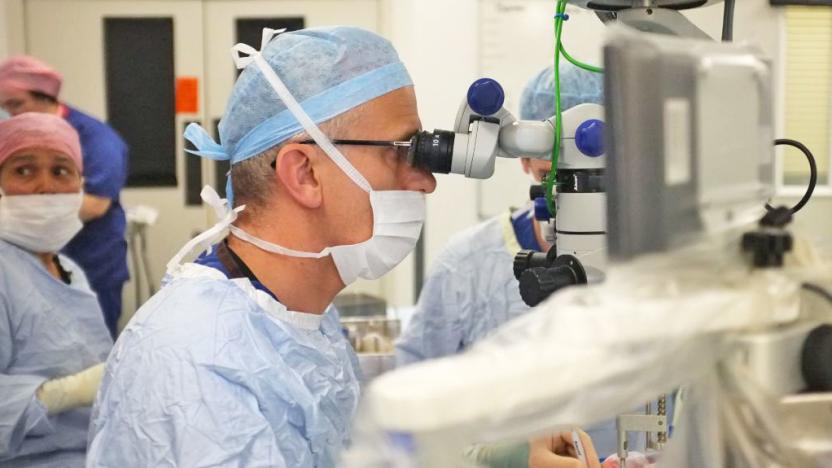oxford
Latest

'PowerWash Simulator' players can now aid mental health research
Help researchers study the link between gaming and wellbeing as you blast muck away from a playground.

Hitting the Books: The Brooksian revolution that led to rational robots
In his new book, A Brief History of Artificial Intelligence, Oxford professor Michael Woolridge leads readers on an exciting tour of the history of AI, its present capabilities, and where the field is heading into the future.

'Animal Crossing: New Horizons' may actually be good for you
An Oxford study tapped into data from Nintendo and EA.

Pop-up EV charger disappears when it's not being used
Electric vehicles face a lot of challenges in the push for mainstream adoption, and the proximity to domestic charging points is one of them. No problems there if you've got a driveway where you can install a charger, but for those living in built-up areas where on-street parking is the only option, getting an EV is all but out of the question. Enter Urban Electric, a company that's developed EV charging points that literally pop out of the ground.

Oxford plans to be a zero-emission city by 2035
All fuel-burning vehicles could be barred from entering Oxford city centre under new plans designed to turn it into the "world's first Zero Emission Zone." In a bid to drastically cut air pollution, Oxford City Council and Oxfordshire County Council submitted a joint proposal that would ban petrol and diesel cars from a small number of streets from 2020 and encompass the entire city centre in 2035.

High-tech solutions top the list in the fight against eye disease
"The eyes are the window to the soul," the adage goes, but these days our eyes could be better compared to our ethernet connection to the world. According to a 2006 study conducted by the University of Pennsylvania, the human retina is capable of transmitting 10 million bits of information per second. But for as potent as our visual capabilities are, there's a whole lot that can go wrong with the human eye. Cataracts, glaucoma and age-related macular degeneration (AMD) are three of the leading causes of blindness the world over. Though we may not have robotic ocular prosthetics just yet, a number of recent ophthalmological advancements will help keep the blinds over those windows from being lowered.

Robot that performs surgery inside your eye passes clinical trial
The next time you go under the knife for retinal surgery, it may not be a human hand holding the blade. That's because a revolutionary surgical system developed University of Oxford in the United Kingdom, which just passed its first set of clinical trials, is able to perform these intricate operations better than even the steadiest surgeon.

After Math: Are you kidding me?
It's been a brutal week for American democracy but there's still plenty of face-palmingly bad news from the tech sector to go around. Apple's trying to bilk its customers out of $300 for a coffee table book, Stephen Hawking figures we've got less than a millennium before we completely destroy the Earth and neo-nazis are building an army of "fake black people" with which to harass Twitter users. On the plus side, you'll be able to take some free online courses from Oxford next year -- at least until the Trump brand internment camps open.

ICYMI: Relax while a robot takes care of your yard work
try{document.getElementById("aol-cms-player-1").style.display="none";}catch(e){}Today on In Case You Missed It: Kobi is a yard work robot that is purportedly able to clean leaves, mow the lawn and shovel snow, though the promo video shows it very briefly moving snow only, so stand by for reviews on that rush purchase. Meanwhile UCSF researchers found that infant brains actually move neurons around up to three months after birth, which is not something we'd known before. The self-driving car experiment out of the University of Oxford wrapped up with a sweet little send-off video. If you're interested in the LED suit from Red Bull, that video is here. As always, please share any interesting tech or science videos you find by using the #ICYMI hashtag on Twitter for @mskerryd.

Scientists dream up a power station staffed by bacteria
If The Matrix is to be taken as a serious manifesto for the future of technology, then living organisms are a great source of potential energy. Now, a team at Oxford University has given some weight to the idea after successfully simulating a biological power station. Researchers used computers to model the behavior of bacteria as it swam around a liquid suspension. When they subsequently added a network of donkey wheel-like structures, the bacteria began moving in predictable patterns around the wheels. The motion was sufficient to generate tiny amounts of energy that could be used to power microscopic gadgets.

Researchers believe they've discovered 'anti-memories'
According to new research out of Oxford University, and published in the journal Neuron, a team of scientists believe that they've found the neurological equivalent of anti-matter. Just as anti-matter acts as the mirror image of subatomic particles, these "anti-memories" may exist as the bizarro versions of our memories.

Oxford Dictionaries' Word of the Year is... an emoji
Oxford Dictionaries' Word of the Year is as much about capturing the cultural zeitgeist as it is reflecting the evolution of the English language, and that's truer than ever in 2015. For the first time ever, the institution chose emoji (the "tears of joy" icon you see above) to win the honor -- yes, actual words lost out. It's an odd decision, to put it mildly, but Oxford notes that the use of the word "emoji" more than tripled in the space of the past year, and the tears image was the most popular emoji worldwide.

Researchers see evolution working faster than expected (in chickens)
The word "evolution" tends to conjure up images of early hominids dodging predators on the veldt as they inch — agonizingly slowly — toward modern humanity. Most of those popular images of evolution are steeped in antiquity because, well, evolution takes ages, right? Well, a study conducted by researchers at the University of Oxford involving the humble chicken suggests evolution doesn't always take as long as you might think.

BMW's 'Light & Charge' street lamps double as EV chargers
If you own an electric car, your two main charging options are plugging in at home or connecting to a public charging station like one of Tesla's Superchargers. Home charging is simple enough, but there aren't a huge amount of public terminals available. BMW has been experimenting with ways to power its growing number of electric cars in public spaces, and came up with the idea of turning LED street lamps into charging locations. The lamps, known as Light & Charge, have a modular design that BMW says "can be installed anywhere" and utilize up to four LED modules for night lighting on main roads or two in quieter areas.

Oxford University's smart glasses help people with partial vision see more detail
When we hear the term "smart glasses" these days, we tend to focus more on the smart and less on the glasses. Researchers at Oxford University see things the other way around: putting the emphasis on glasses suggests a device that helps the visually impaired see the world, not augment it. This is the project Dr. Stephen Hicks of the Nullfield Department of Clinical Neurosciences at the University of Oxford has been working on: a wearable designed to give folks with partial vision a clearer view of their surroundings. It's not as flashy as Google Glass, but it has the potential to change lives. It's also being tested in the wild.

Move aside graphene, there's a new wonder-material on its way
Everyone talks about graphene as if it'll solve all of the world's problems, forgetting that it's got a few of its own, too. The biggest issue is that the substance only works in two dimensions, making it hard to use to build complex pieces of hardware. That's why researchers from Oxford, Stanford and the Lawrence Berkeley National Laboratory are turning their attentions to Cadmium Arsenide. Like its more famous frenemy, the substance can transmit electricity at tremendous speeds, but will also work in three dimensions, which is far more useful when building transistors and sensors. Researcher Yulin Chen goes so far as to say that this "family of materials could be a good candidate for everyday use." It's easy to make bold claims before the locked doors of a university lab, but still, if smartphones are ever going to make use of graphene in the real, three-dimensional world, then this could be the missing piece in the puzzle. [Image Credit: Greg Stewart / SLAC]

Researchers testing frugal autonomous car system, aim for $150 price tag (video)
Google certainly has pockets deep enough to trick out self-driving cars with any kind of pricey gear, but researchers at the University of Oxford have begun testing a solution that aims to keep things affordable. Currently, the system leverages an array of low-profile stereo cameras and lasers that rings up at about £5,000 (approximately $7,750), but the next goal is to knock the price down to £500, and eventually to a cool £100 (roughly $150). "Really, we do need to solve the engineering challenges of not relying on expensive sensors, but relying on cheap sensors," Professor Paul Newman told the Telegraph. "But doing some really smart things with those cheap sensor feeds." Rather than a vehicle that acts as a chauffeur at all times, Newman's vision for the modified Nissan Leaf, dubbed RobotCar, is for it to take control on select occasions. While drivers go about their commute, the system composes a 3D map of the car's environs and commits it to memory. When the auto identifies a familiar setting and feels confident about its ability to take the reigns, it could let the driver know it's ready to assume control. Right now, the automobile's been tested on private roads, but the team behind it is working with the UK's Department of Transportation to roll it onto public streets. Head past the jump for a glimpse of RobotCar in action.

Vatican and Oxford libraries scan ancient works, let scholars stay in their armchairs
Two of the world's most hallowed libraries are about to get even quieter, having been given $3 million to go with the flow and put some of their oldest collections online. The Vatican Library and Oxford University's Bodleian Library will together offer up 1.5 million pages of hoary text, including Gutenberg's Latin Bible from the 15th Century, a 1,200-year-old Hebrew codex called the "Sifra," and enough Greek philosophy to make even Homer seem succinct. At the end of a five-year flatbed scanner marathon, these digital copies will be accessible to speakers of dead languages everywhere, and hopefully for less than sacrilegious prices.

Oxford researchers show off autonomous Wildcat vehicle, no GPS required
BAE Systems has spent years developing an autonomous vehicle based on the rather menacing Bowler Wildcat, but it recently turned the project over to Oxford University, which is now showing off some of the improvements that its researchers have made. Chief among those are a new array of sensors adorning the vehicle, which promise to let it more accurately map out its surroundings and navigate without relying on GPS -- that not only includes monitoring the road (or lack of road, as the case may be), but keeping an eye on traffic patterns and changing conditions, and watching for pedestrians and other obstacles. That's the same basic idea seen from the likes of Google's self-driving cars, of course, although we're pretty sure this could drive over one of those if it wanted to. Head on past the break for some videos showing off the vehicle's capabilities, and hit the source link below for a few more.

Volunteer scientists discover two possible planets, tell NASA it missed a spot
Proving it's not all about edu-mah-cation, a group of casual star-gazers has stumbled upon what might well be a pair of new planets. Following on from gamers' success with complicated medical puzzles, an army of 40,000 online volunteer astronomy nerds signed up to the Planet Hunters project to help mine through NASA data. One of the possible planets they discovered is roughly two and a half times the size of Earth, while the other a whopping eight times bigger than this revolving ball of blue and green we call home. The project uses data from NASA's Kepler telescope, which registers fluctuations in brightness as objects pass in front of distant stars -- a setup that's helped scientists discover 1,235 potential alien planets in its first four months. Obviously, though, the technology isn't perfect, which is where the project's muggle volunteers (assisted by Oxford and University of Chicago researchers) come in. They've been combing through NASA's readings and are now sifting through the next 90 days of Kepler observations. [Image credit: NASA]












